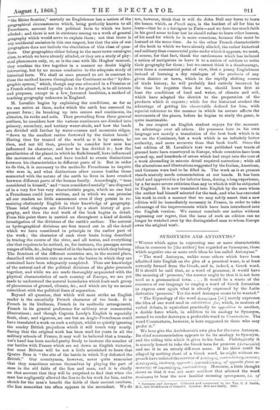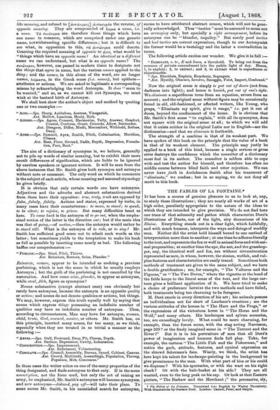SYNONYMNS AND ANTONYMS.* "WORDS which agree in expressing one or
more characteristic ideas in common he [the author] has regarded as Synonyms, those which negative one or more such ideas he has called Antonyms."
"The word Antonym, unlike some others which have been admitted into English on the plea of a practical want, is at least correctly formed from the Greek, and is, indeed, a Greek word. If it should be said that, as a word of grammar, it would have the meaning of 'pronoun,' the answer might be that it is not here used as a grammatical term. . . . It would be a waste of the resources of our language to employ a word of Greek formation to express over again what is already expressed by the Latin derivative 'pronoun.' Yet the word Antonym seems to be wanted."
"The Etymology of the word civrawilhia [sic] merely expresses the idea of one word used in substitution for, which, in matters of verbal debate, is equivalent practically to opposition to another, a double force which, in addition to its analogy to Synonym, seemed to render Antonym a preferable word to Counterierm. The word Counterterm, however, is here suggested to those who may prefer it."
We here give the Archdeacon's own plea for the term Antonym. Its chief recommendation appears to be its analogy to Synonym, and the telling title which it gives to his book. Philologically it is scarcely honest to take the Greek term for pronoun (arrconspia) and use it in an utterly different sense. If his thirst could be allayed by nothing short of a Greek word, he might without re- proach have enlisted the services of avriXopc, contradictory, reverse ; civriXo7rx6;, contrary, opposite; ivavriooLwapoc, of opposite force or meaning; or ipayri 0%67 0,7, contradictory. Moreover, a little thought shows us that it was not mere accident that allowed the word cruys:otspo; to bear the now familiar meaning synonymous, i.e. of • Synonyms and Antonyms. Collected and contrasted by the Van. C. J. Smith, MA., late Archdeacon of Jamaica. London : Dell and Daldy. 1867.
like meaning, and refused to [ityrtLvvizo;] avrwvvp.la the reverse, of opposite meaning. They are compounded of Ovo,a,a a name, i.e.
a noun. Tic suro'nwhec are therefore those things which have one name in common, which are comprised under one generic name, notwithstanding specific differences ; but it is difficult to see what, in opposition to this, rek itaorulywhcc could denote. Granting the required meaning of opposite to apri, what would be "things which have an opposite name? An identical or a different name we can understand, but what is an opposite name? The trunLywhoy, however, nas passed in modern times to designate not the things that agree in name, but the various names applied to the thing ; and the names, in this abuse of the word, are no longer
names, 46,u,ara, in the Greek sense (i.e. nouns), but epithets— attributes or actions. We are asked to legitimate a corresponding misuse by acknowledging the word Antonym. It does "seem to be wanted," and so, as we cannot kill out Synonym, we must
wink at the bastard birth of Antonym.
We shall best show the author's object and method by quoting one or two examples :—
" Acm.—Syn. Sharp, Acidulous, Acetose, Vinegarish.
Ant. Mellow, Luscious, Mealy, Rich.
" Acceitn.—Syn. Agree, Consent, Harmonize, Tally, Answer, Comfort, Consist, Conform, Grant, Concede, Allow, Surrender. Ant. Disagree, Differ, Misfit, Miscomfort, Withhold, Refuse, Deny. " Acpus.—Syn. Summit, Ape; Zenith, Pitch, Culmination, Meridian, Climax.
Ant. Base, Floor, Ground, Nadir, Depth, Depression, Founda- tion, Foot, Root."
The aim of a dictionary of synonyms is, we believe, generally not to pile up words of similar meaning, but to exhibit their more occult differences of signification, which are liable to be ignored by careless speakers or ignorant writers. It will be seen from the above instances that Mr. Smith gives both synonym and antonym without note or comment. The only word on which he comments is the subject of each article, whose meaning and assumed etymology he gives briefly.
It is obvious that only certain words can have antonyms. Adjectives and the adverbs and abstract substantives derived from them have their opposites : true, truly, truth are opposed by false, falsely, falsity. Actions and states, expressed by verbs, in many cases have their counterterms : to move, to stand; to speak, to be silent; to rejoice, to grieve. But many difficulties beset us here. To come back is the antonym of to go out, when the empha- sized notion of the latter is the direction out; but if the main idea -was that of going,—of motion,—then the antonym would rather be to stand still. What is the antonym of to ride, or to sing ? Mr. Smith has sufficient good sense not to admit such words as the latter ; but sometimes yields to the temptation to make his book as full as possible by inserting some nearly as bad. The following baffles our comprehension :—
"Pumeni.—Syn. Steal, Filch, Thieve. Ant. Reinstate, Restore, Seize, Plunder."
Reinstate, restore, appear to be intended as undoing a previous purloining, which is not the sense in which he usually employs Antonym ; but the guilt of the purloining is not cancelled by the restoration. And how come seize, plunder, to appear as antonyms, while steal, filch, figure as synonyms?
Nouns substantive (except abstract ones) can obviously but rarely have antonyms, because the antonym is an opposite quality or action; and nouns do not denote qualities or actions, but things.
We may, however, express this truth equally well by saying that nouns which express things possessing an indefinite number of qualities may have an indefinite number of antonyms. Thus, according to circumstances, Man may have for antonym, woman, child, brute, God, coward, master, or others. Mr. Smith has, on this principle, inserted many nouns, far too many, as we think, especially when they are treated in so trivial a manner as the following :—
"ABYSS.—Syn. Gulf, Profound, Deep, Pit, Chasm, Depth.
Ant. Surface, Depression, Cavity, Indentation.
" CoNscstrrrioN.—Syn. Impressment.
Ant. Enlistment, Volunteering.
"Comava.—Syn. Council, Assembly, Bureau, Synod, Cabinet, Caucus.
Ant. Crowd, Multitude, Assemblage, Population, Throng, Populace, Mob, Concourse."
In these cases the writer seizes on one of the many properties of the thing designated, and finds antonyms to that only. If in the noun conscription, not the force used, but only the act of raising an army, be emphasized, Mr. Smith's antonyms will become synonyms, and new antonyms—disband, pay off—will take their place. To some nouns Mr. Smith, in his unsatisfied search for antonyms, seems to have attributed abstract senses, which will not be gene- rally acknowledged. Thus "tactics "must be assumed to mean not an arranging only, but specially a right arrangement, before its antonyms can be "blunder, impolicy." But surely good tactics and bad tactics are correct expressions, though to our Antonyrnist the former would be a tautology and the latter a contradiction in terms.
The following article excites our wonder. We give it in full :—
"Eimuniern V. tr., E and limen, a threshold. To bring out from the recesses of private concealment into the public light of day. Hence, 1, to explain ; 2, to extract ; and 3, to extract what is superfluous or objectionable. " Syn. Elucidate, Explain, Enucleate, Segregate.
"Ant. Mystify, Obscure, Involve, Smuggle, Foist, Import, Confound."
Now the original sense is simply to put out of doors (not from
darkness into light) ; and hence to banish, put out of one's sight.. We eliminate a superfluous term from an equation, errors from an
account ; and the original sense without figure may be occasionally found in old, old-fashioned, or affected writers, like Young, who prays, "Eliminate my spirit, give it range," i.e. put it out of doors, beyond the confinement of the house. It is obvious that Mr. Smith's first sense "to explain," with all its synonyms, does not square with the original sense at all ; to which we will add that it exists neither in the original Latin nor in English—see the dictionaries—and that we eliminate it forthwith.
The strength of a machine is that of its weakest part. We. have spoken of this book on the principle that the value of a book is that of its weakest element. The principle may justly be
applied to a book of this kind, because a single serious or gross error destroys the confidence which the consulter of a dictionary must feel in its author. The consulter is seldom able to cope with and test the author for himself, and therefore has often no middle course between blind faith and utter rejection. We can
never have faith in Archdeacon Smith after his treatment of "eliminate," we confess ; but in so saying, we do not deny all
merit to this book.































 Previous page
Previous page